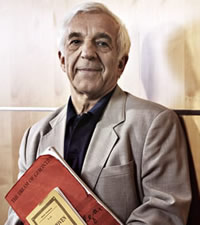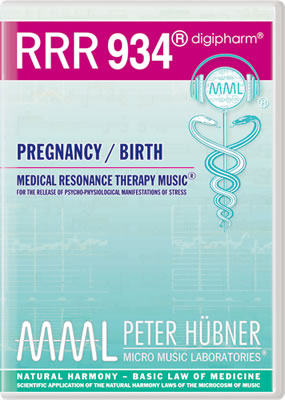| Scientific Music Medicine | |
| Home • Site Map • Research • Reports • Intern. Experts • Music Preparations • Fundamentals • Peter Hübner • Store • Contact | |

The application of Medical Resonance Therapy Music® produced
similar results to those familiar to us from the kangaroo method. Breathing
became calmer and more regular, and respiratory pauses less frequent. Restless
premature babies reacted immediately and fell asleep more quickly; the waking
periods were shorter. Particularly after stress situations (injections, intubation,
etc.) the children calmed down more quickly when under the influence of the
music than they would otherwise have done. Our studies are not yet complete.
Computer-assisted evaluations of our monitoring parameters in the routine operation
of the intensive care ward are still underway. Parallel to this, we are also
carrying out polysomnographic tests in order to obtain an objective assessment
of the effects of music therapy, which have so far been subjective.
Similarly positive, particularly calming effects were observed in children suffering from heart disorders, in cases of neurovegatative disorders (particularly in sympathicotonic cases), in motor-hyperactive children, and particularly in children who were hard to discipline, and those whose behavior and development was disturbed.
Ladies and gentlemen, the studies and observations presented, variously suggest that the effects of Medical Resonance Therapy Music® do occur objectively – for they occur independent of whether the listeners find the Medical Resonance Therapy Music® pleasant, whether they are indifferent to it, or whether, in terms of taste, they are not really keen on it at all. And anyway, children are incorruptible.
The fundamental significance of the natural order for ones health can be summed up in the following example: If you deny a person food, this soon gives rise to many symptoms: his circulation will weaken, his sleep will be disturbed, he will be susceptible to giddiness, etc. All of these symptoms can be healed by one simple course of therapy: by providing sufficient food. Just as much as it requires food, our organism needs natural order, and it therefore possesses highly complex systems, in order to be able to restore natural order as soon as possible following any disruption.
In the opinion of ancient doctors, our organism reacts to music like a resonance or sounding body and, by means of the correctly structured music, its processes can be brought back into their natural order – that is to say, harmonized. When the natural order of the organism is disturbed, this is comparable to the denial of food. The disruption of the order will soon give rise to a multitude of different symptoms of illness. If one succeeds in strengthening the natural order again, this alone will banish the diverse symptoms of illness which the disorder had brought about.
Just like modern physicians, ancient scholars pointed out the great importance of natural order for a life in good health and promoted the application of harmonically structured music as a kind of essential supply of natural order and harmony for the people. Via the ear, music has direct access to the brain, and if one looks at the results of studies carried out with Medical Resonance Therapy Music®, it certainly looks as if vital functions which have been drawn into chaos can be brought back into order with the help of harmonical music. This could explain the diversity of the effects of Medical Resonance Therapy Music®.
In his book ‘The Back of the Mirror. An Attempt at a Natural History of Human Cognition’ the Nobel prize-winner, Konrad Lorenz, sensing increasing human aggression, wrote thus: ‘The progressive decline of our culture is so obviously of a pathological nature, so obviously possesses the features of a sickness of the human mind, that there is a categorical necessity for a medical science aspect in the examination of culture and of the mind’.
Similarly positive, particularly calming effects were observed in children suffering from heart disorders, in cases of neurovegatative disorders (particularly in sympathicotonic cases), in motor-hyperactive children, and particularly in children who were hard to discipline, and those whose behavior and development was disturbed.
Ladies and gentlemen, the studies and observations presented, variously suggest that the effects of Medical Resonance Therapy Music® do occur objectively – for they occur independent of whether the listeners find the Medical Resonance Therapy Music® pleasant, whether they are indifferent to it, or whether, in terms of taste, they are not really keen on it at all. And anyway, children are incorruptible.
The fundamental significance of the natural order for ones health can be summed up in the following example: If you deny a person food, this soon gives rise to many symptoms: his circulation will weaken, his sleep will be disturbed, he will be susceptible to giddiness, etc. All of these symptoms can be healed by one simple course of therapy: by providing sufficient food. Just as much as it requires food, our organism needs natural order, and it therefore possesses highly complex systems, in order to be able to restore natural order as soon as possible following any disruption.
In the opinion of ancient doctors, our organism reacts to music like a resonance or sounding body and, by means of the correctly structured music, its processes can be brought back into their natural order – that is to say, harmonized. When the natural order of the organism is disturbed, this is comparable to the denial of food. The disruption of the order will soon give rise to a multitude of different symptoms of illness. If one succeeds in strengthening the natural order again, this alone will banish the diverse symptoms of illness which the disorder had brought about.
Just like modern physicians, ancient scholars pointed out the great importance of natural order for a life in good health and promoted the application of harmonically structured music as a kind of essential supply of natural order and harmony for the people. Via the ear, music has direct access to the brain, and if one looks at the results of studies carried out with Medical Resonance Therapy Music®, it certainly looks as if vital functions which have been drawn into chaos can be brought back into order with the help of harmonical music. This could explain the diversity of the effects of Medical Resonance Therapy Music®.
In his book ‘The Back of the Mirror. An Attempt at a Natural History of Human Cognition’ the Nobel prize-winner, Konrad Lorenz, sensing increasing human aggression, wrote thus: ‘The progressive decline of our culture is so obviously of a pathological nature, so obviously possesses the features of a sickness of the human mind, that there is a categorical necessity for a medical science aspect in the examination of culture and of the mind’.

Vladimir Ashkenazy
one of the best pianists of our time
Principal Conductor and Artistic Adviser: Sydney Symphony • Conductor Laureate: NHK Symphony Orchestra, Tokyo • Conductor Laureate: Philharmonia Orchestra, London • Conductor Laureate: Iceland Symphony Orchestra • Music Director: European Union Youth Orchestra
Does this not come very close to the answer which Vladimir Ashkenazy – one of the most important pianists of our time, leading conductor of the German Symphony Orchestra in Berlin and musical director of the London Royal Philharmonic Orchestra – once formulated and which I think provides very apt words to close with:
‘Music plays a very important role in our life – whether we are aware of it or not. And different kinds and structures of music can have an extremely negative or uplifting effect – not only on the individual’s psyche, but also on the entire spectrum of a society’s psychological and emotional climate.
I hope that everyone who wishes to contribute to a state of natural harmony – individual and social –, will give serious thought to Peter Hübner’s scientific work and becomes aware of its immense importance.’
I hope that everyone who wishes to contribute to a state of natural harmony – individual and social –, will give serious thought to Peter Hübner’s scientific work and becomes aware of its immense importance.’
|
MEDICAL RESONANCE THERAPY MUSIC® Medical Music Preparations on CD |
|||
|
With kind permission of AAR EDITION INTERNATIONAL
© 1998- SCIENTIFIC MUSIC MEDICINE | Contact
Subject to change in the interests of scientific advancement.
© 1998- SCIENTIFIC MUSIC MEDICINE | Contact
Subject to change in the interests of scientific advancement.
